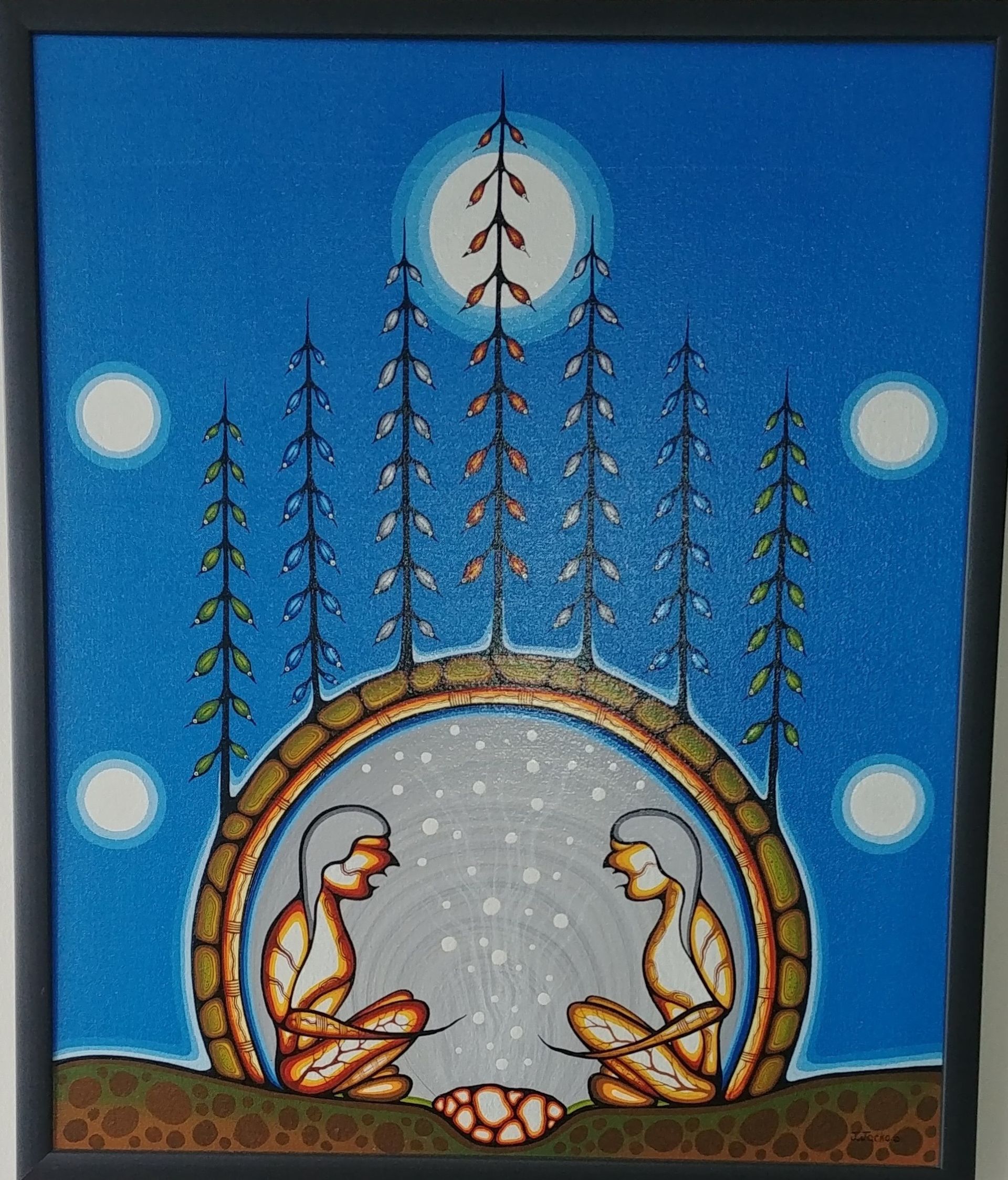A H Harry Oussoren et al • October 19, 2021
The Indigenous Peoples Fund - A Proposal

[Use the following link for a brief explanation of the Two-Row Wampum
concept. https://briarpatchmagazine.com/articles/view/a-short-introduction-to-the-two-row-wampum source.]
~ ~ ~ ~ ~ ~ ~ ~ ~ ~ ~ ~ ~
A Concept Proposal towards Transforming Indigenous and Settler Relationships
PUBLIC DRAFT
– October 18, 2021 – for discussion and feedback
(see note to reader below)
A. Introduction
“Discovery”
In the spring of 1497, Italian explorer John Cabot unfurled the cross of St. George and, in the name of King Henry II of England, claimed the area where he landed (was it Newfoundland or ?) for the English Crown. On July 24, 1534, Jacques Cartier planted a 30-foot cross bearing the fleur-de-lis
and the words Vive le Roy de France
near Perce Rock in the Gaspe area.
Based on the “Doctrine of Discovery” enunciated by Pope Alexander VI in the May 4, 1493 Papal Bull “Inter Caetera” and on the “terrae nullius” concept,* these “discovered” lands became territories of the Christian Sovereigns of England and France, respectively. By papal authority and with the sign of the cross, Indigenous Peoples and their traditional territories – all Turtle Island - and resources were made involuntary subjects of these foreign Christian Crowns.
Through the centuries to the present, this claimed sovereignty expanded and has continued in what eventually became the various British colonies. A new era arrived with the Confederation of Canada in 1867 and its misbegotten Indian Act of 1876. The Act, variously amended since its inception by the federal government, empowered the Crown to control most of Indigenous life – especially “status Indians” - including land, resources, education, health, culture, and much more, even in today’s Canada.
Effectively, Canadians were divided into two unequally treated groups: the privileged Settler population enjoying all the human rights, freedoms, and provisions afforded by law, while Indigenous people were subjugated to the controls and co nstraints of the Indian Act and its enforcers.+
For over 500 years and still counting, Canada’s Indigenous peoples have been subjected to quasi-legal colonial settler power, authority, religion, and racist policies of assimilation leading to impoverishment and genocide. Restricted to and controlled in reserves totaling about 2% of the Canadian land mass and harassed by constant, manipulative efforts to cede and extinguish remaining land claims and resource rights, Indigenous peoples have seen their traditional heritage lands parceled out by the Crown to settler peoples harvesting the rich resources of land and sea. The Crown dealt to presumed superior settlers the wealth of land and sea, while the presumed inferior Indigenous peoples harvested poverty and dependency on government for subsistence program funding.
This faux-legal arrangement has gone on far too long. It is urgently overdue to acknowledge the dehumanization and injustice perpetrated against the Indigenous Peoples by colonial settler political, military, and economic power based on specious religious declarations. The United Nations’ Declaration on the Rights of Indigenous Peoples, affirmed by Parliament in 2021, is a much more authoritative and justice-based guide affirming the inherent rights of Indigenous Peoples in Canada and globally.
Along history’s ways, the voice of justice for Indigenous Peoples has not failed to challenge the mindset of domination. The Royal Proclamation of 1763, the Constitution Act of 1982, some treaty implementation efforts, various legal judgements of the Supreme Court of Canada, and far too many commissions and studies, including the Truth & Reconciliation Commission with its 94 calls to action - all have revealed the extent to which Indigenous Peoples have been disrespected and denied justice.
Nevertheless, these glimmers of law-and-order have put in place substantial foundations for transforming the relationship between Indigenous and Colonial Settler peoples and for affirming the good life every Canadian rightfully seeks. The honour of the Crown and the integrity of Canada demands that this transformation be advanced without delay, and that Indigenous Peoples too experience their full right to justice and self-determination.
This proposal is intended to move the needle toward that full justice. We, the undersigned, recognize that ritualized words about “traditional Indigenous lands” have been only a tiny first step toward this transformation. For these words to have real meaning they must be married to action. Our proposal would transform that tiny step into a large leap toward substantial meaningful action.
B. The Proposal
The Indigenous Peoples Fund (IPF)
Specifically, we propose that the Parliament of Canada mandate the creation of an Indigenous Peoples Fund. The IPF would be resourced by a one percent tax – analogous to the Goods & Services/Harmonized Sales Tax - on all real estate sales in Canada. The ways and means of collecting the tax would require further study and negotiation.
The control and stewardship of the IPF would not be lodged with the government of Canada, but the federal government would mandate standards and practices to ensure public accountability and transparency.
The amount of total annual real estate sales in Canada requires further research but could amount to as much as $500 billion. One percent might generate about $5 billion. The IPF can go a long way toward freeing Indigenous Peoples from reliance on much of the humiliating special request “hand-outs” regime federal governments employ.
Human Development Focus
We believe in the Fund's liberating effect because the one percent tax is intended to be an investment in Indigenous human development. It would aim to enhance the capacity of Indigenous Peoples to close the social and economic gaps that separate Settler and Indigenous communities; to contribute Indigenous experience, knowledge, wisdom, expertise, and spirituality within and beyond their communities; and “to provide a foundation for [Indigenous Peoples’] economic self-sufficiency.”#
Dependency patterns can end only when Indigenous Peoples of all ages have access to resources that enable personal transformation, community development, and strengthened capacity to engage economic, social, and political structures.
The primary means toward Indigenous human development is education, ensuring all ages – from early childhood through to seniors - have access to diverse learning opportunities that equip them for the full and varied life that gives meaning and purpose, while contributing to the well-being of the entire society. The IPF would make this level of investment possible and would, we believe, reap benefits - far beyond the actual dollars collected - for all Canadians. Effective stewardship of land- and sea-based assets is an obvious priority enabling Indigenous people to participate in national and international economies.
Current Federal programs mandated by Treaties and the Indian Act would continue in force until replaced by mutually agreed alternatives. The IPF is not a concluding settlement for these Federal responsibilities, nor a form of reparations or restitution for injustices experienced.
An Inclusive Pan-Canadian Indigenous Peoples Fund Agency
To govern the IPF, an independent pan-Canadian indigenous agency representative nationally of all First Nations, Inuit, and Metis peoples is envisioned. It might evolve to include regional branches. The agency would be ratified by act of Parliament. The organization would govern the IPF according to principles and objectives determined by Indigenous Peoples themselves.
It is clear that the creation of such an agency is no simple matter. The diversity of the Indigenous Peoples is as real as it is for Canada’s Settler peoples. But it is equally clear that unity among Indigenous Peoples is an essential factor in any process seeking to transform the current and historic patterns of Colonial Settler paternalism and injustice hobbling Indigenous Peoples. These debilitating conditions must be addressed together and transcended if Indigenous Peoples are to be full, participating members of the body politic and society as a whole. The IPF agency would be a crucial vehicle in this task.
The Context Calls for a Transformed Relationship
More than ever, the years ahead for Canada require that all Canadians have a strengthened capacity to engage the demanding social, health, ecological, economic, political, spiritual challenges before us. It is our conviction that an IPF focused on the development needs of all Indigenous People can contribute substantially to the well-being of the entire Canadian society in an inter-dependent world.
We have consulted widely and share the growing conviction, sparked by too many tragic, unjust experiences and discoveries of Indigenous loss, that this is now time for transformation to happen. We believe Canadians throughout the land understand the need for a transformed relationship between the two realms.< Encouraged by popular “grass roots” wisdom and longing, and increasing calls for justice, we believe that these voices must couple with visionary political leadership in both Indigenous and Settler communities for a new future. An Indigenous Peoples Fund to which all will contribute directly or indirectly can help it happen and serves as a sign of good faith in any authentic journey toward reconciliACTION.
Footnotes:
*Terrae nullius = uninhabited lands or literally, lands of no one. The Papal Bulls made clear that “pagan” and “heathen” people in “barbarous” lands that were “discovered” were to be conquered and brought to the Christian religion
+
Clarifying common misconceptions is: “21 Things You May Not Know about the Indian Act, Helping Canadians Make Reconciliation with Indigenous People a Reality” by Bob Joseph, 2018.
#
”Living Treaties: Lasting Agreements – Report of the Task Force to Review Comprehensive Claims Policy” 1985. The Coolican Report. P.102
< See Call to Action #45 in the report of the Truth and Reconciliation Commission of Canada.
Grass Roots Group for the Indigenous Peoples Fund
(with email contact information)
Mark MacDonald
Stan Beardy
Wendy Fletcher-Marsh
Laverne Jacobs
Maggie Dieter
Harry Oussoren
– [email protected] (administration)
~ ~ ~ ~ ~ ~ ~ ~ ~ ~ ~ ~ ~
Dear Reader:
This “Public Draft” version of our proposal includes an invitation to reflect, to discuss, and to offer feedback – critical and affirming - including ideas that might strengthen this initiative.
If you were part of the consultation process for the concept, please respond to the Group member with whom you may have discussed the idea.
If this is a new idea for you, please share your impressions with any member of the Group or via "administration" or via the comment section below.
Your interest in and support for the proposal is invited and welcome.
Thank you!

